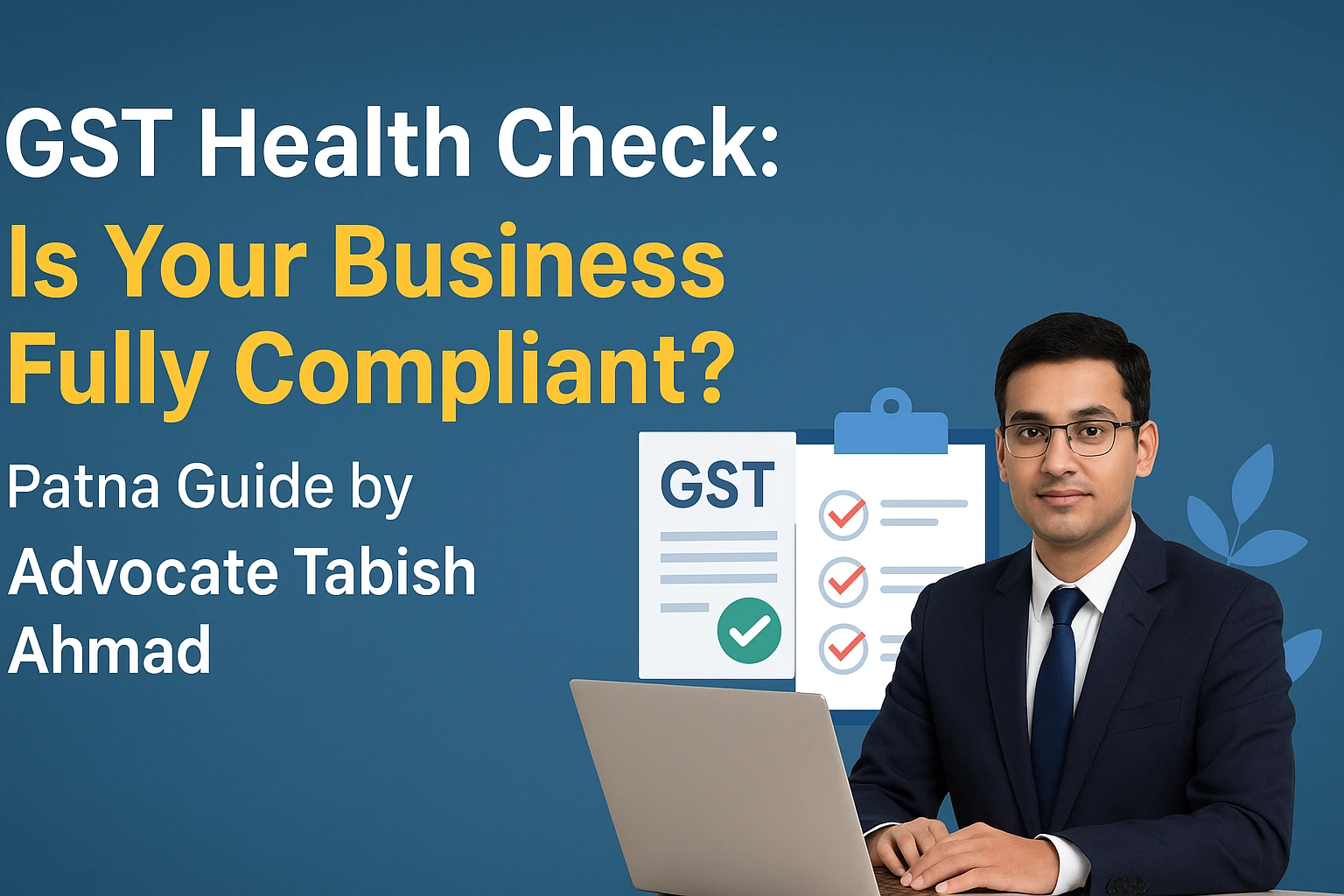GST Health Check: Is Your Business Fully Compliant? — Patna Guide by Advocate Tabish Ahmad

GST Health Check: Is Your Business Fully Compliant?
Every business operating under the Goods and Services Tax (GST) framework is expected to maintain continuous and accurate compliance. However, many enterprises in Patna and across Bihar are often unaware of discrepancies in their filings, input tax credit claims, reconciliations, and e-invoicing obligations. A dedicated GST health check helps identify such gaps early, ensuring your business remains fully aligned with statutory requirements.
This article, authored by Advocate Tabish Ahmad, provides a comprehensive guide to evaluating GST compliance for businesses in Patna. With evolving regulations, frequent amendments, and increasing departmental scrutiny, a systematic GST health check is not just recommended—it is strategically essential. Whether you operate a small business or corporate entity, this guide will help you understand the legal basis, process, documentation, benefits, and professional support available through Bihar Tax Consultant.
WHAT IS A GST HEALTH CHECK?
A GST health check is a detailed assessment of a business’s overall GST compliance. It includes reviewing records, tax positions, filing consistency, reconciliations, and adherence to the provisions of the Central Goods and Services Tax Act, 2017 and related Rules.
Purpose of a GST Health Check
Identify compliance gaps early
Minimise exposure to interest, demand notices, and penalties
Ensure accurate input tax credit (ITC) utilisation
Strengthen internal controls and tax governance
A health check is not an audit under the Act; instead, it is a voluntary preventive review that allows businesses to correct issues before the department raises objections.
LEGAL BASIS UNDER INDIAN LAW
GST compliance is primarily governed by:
CGST Act, 2017
Bihar SGST Act, 2017
IGST Act, 2017
GST Rules, notifications, and circulars issued by CBIC
Though a “health check” is not a statutory requirement, the following provisions make regular reviews essential:
1. Self-Assessment System
Under Section 59, taxpayers must self-assess their tax liability. A health check ensures this assessment is accurate.
2. Input Tax Credit (ITC) Restrictions
Sections 16–21 impose strict conditions for availing ITC. Mismatches in GSTR-2B, e-invoicing, or unregistered vendors can invalidate credits.
3. Scrutiny and Audit Risks
Sections 61, 65, 66, and 67 empower authorities to initiate scrutiny, audits, and inspections. A proactive health check minimises such risks.
4. E-Invoicing & Record Maintenance
Businesses must comply with evolving mandates on e-invoicing, HSN reporting, and document retention.
A legal review helps you remain prepared for departmental verification at any time.
WHY CONDUCT A GST HEALTH CHECK IN PATNA?
Patna is emerging as a major centre for manufacturing, trading, logistics, education, and service industries. With increasing registration volumes and departmental vigilance in Bihar, businesses face tighter scrutiny of GST compliance.
Advantages for Patna-Based Businesses
Enforcement units in Patna regularly issue notices for ITC mismatches
Transition to e-invoicing requires system readiness
Small businesses often overlook GSTR-1 and GSTR-3B consistency
Local vendors may not file returns on time, affecting your ITC
A GST health check ensures your business stays protected from compliance lapses and departmental demands that could disrupt operations.
For related support, you may refer to our internal guide: [GST Registration in Patna].
STEP-BY-STEP GST HEALTH CHECK PROCESS
1. Preliminary Review of GST Profile
Verification of GSTIN status
Checking business activity codes (HSN/SAC)
Evaluating registration amendments
2. Review of GST Returns
A thorough examination of:
GSTR-1
GSTR-3B
GSTR-9 / 9C (if applicable)
E-way bill history
E-invoicing data
3. ITC Reconciliation
Matching purchase register with GSTR-2B
Identifying blocked credits under Section 17(5)
Reviewing vendor compliance levels
4. Output Tax Liability Verification
Checking rate classification
Cross-verifying outward supplies
Reverse charge mechanism (RCM) applicability
5. Compliance Gap Report
At the end of the review, you receive a written report highlighting:
Discrepancies
Corrective measures
Legal risks
Recommended compliance strategy
This structured approach ensures complete coverage of compliance areas.
DOCUMENTS REQUIRED
GST registration certificate
GSTR-1, 3B, and 2B for all applicable months
GSTR-9 / 9C (if filed)
Sales and purchase registers
Input tax credit ledgers
Expense ledger
E-way bill statements
E-invoicing reports
Bank statements
Trial balance and financial statements
Vendor list with GSTIN
Having organised documentation speeds up the review process and increases accuracy.
LEGAL DRAFTING & CLAUSES (IF APPLICABLE)
While a health check itself is an assessment, certain legal drafting may be needed afterwards:
1. GST Compliance Policy Document
A formal internal policy outlining:
Documentation standards
Approval processes
ITC eligibility checks
Return filing timelines
2. Vendor Compliance Clauses
Businesses may draft clauses for vendor agreements requiring:
Timely filing of GSTR-1 and GSTR-3B
E-invoice compliance
Sharing of monthly filing status
3. Representation to Authorities
If errors are identified, you may require:
Voluntary payment intimation through DRC-03
Replies to notices
Clarification letters
Professional drafting ensures accuracy and protects your interests.
POST-ASSESSMENT COMPLIANCE
After a GST health check, businesses must implement corrective measures promptly.
1. Rectification of Errors
Amend GSTR-1 and GSTR-3B (where permissible)
Reverse wrongly availed ITC
Pay tax shortfall along with interest
2. Improving Internal Accounting
Introduce regular reconciliation practices
Conduct quarterly internal reviews
Update invoice templates as per GST rules
3. Monitoring Vendor Behaviour
Prefer compliant suppliers
Review 2B-based ITC eligibility each month
Use automated tools to track filing status
Routine compliance reduces long-term risks and builds a stronger tax position.
BENEFITS OF A GST HEALTH CHECK
1. Avoid Notices & Penalties
Businesses can prevent:
System-generated notices
Scrutiny demands
Audit observations
2. Optimise Input Tax Credit
A review helps you:
Claim all eligible ITC
Prevent blocked or non-compliant ITC
Improve cash flow management
3. Strengthen Tax Governance
A health check builds a culture of compliance:
Better record-keeping
Faster departmental responses
Improved operational planning
4. Peace of Mind
Knowing your GST affairs are accurate gives business owners confidence and stability.
WHY CHOOSE BIHAR TAX CONSULTANT
Bihar Tax Consultant, operating in Patna, offers legally sound and professional GST services backed by experience and deep knowledge of Indian tax laws.
What Sets Us Apart
Led by Advocate Tabish Ahmad
Expertise in GST compliance, litigation, and advisory
Transparent pricing
Timely communication and updates
Comprehensive documentation support
We offer holistic GST services ranging from registration to departmental representation.
About the Author – Advocate Tabish Ahmad
Advocate Tabish Ahmad (B.A. LL.B., LL.M., Diploma in Cyber Law – GLC Mumbai) is a Certified Cyber Law Practitioner and practising Advocate at the Patna High Court. He specializes in Cyber Crime, GST Litigation, and Tax Appeals, with extensive experience in representing clients before judicial and quasi-judicial forums.
He serves as President of the Cyber Lawyers Association and is a Member of the Advocates’ Association, Patna High Court. As a Mentor at the Indian Tax Academy and JurisCrack, he guides young lawyers and students in cyber and tax law practice.
Author of several books on Cyber Crimes, Taxation, and GST, Advocate Tabish Ahmad is recognized for his practical insights on digital law, data privacy, and cyber fraud defence.

Advocate Tabish Ahmed
EXTERNAL REFERENCES
MCA Portal – Ministry of Corporate Affairs
Income Tax Department
Startup India Portal
FAQs
1. What is the purpose of a GST health check?
A GST health check helps identify compliance gaps, errors in returns, ITC issues, and risks before the tax department raises objections.
2. How often should a business in Patna conduct a GST health check?
Ideally once every financial year, or more frequently if your turnover, vendor base, or supply chain changes.
3. Does a GST health check eliminate the risk of notices?
It significantly reduces risk but does not guarantee immunity. It prepares you with correct records and accurate filings.
4. Is a GST health check mandatory in India?
No, it is voluntary but highly advisable due to the self-assessment system under GST.
5. Who can conduct a GST health check?
Professionals such as advocates, GST practitioners, and tax consultants with experience in compliance and representation.
6. What sectors in Patna benefit most from a GST health check?
Retail, wholesale, logistics, hospitality, manufacturing, educational services, and professional service firms.
